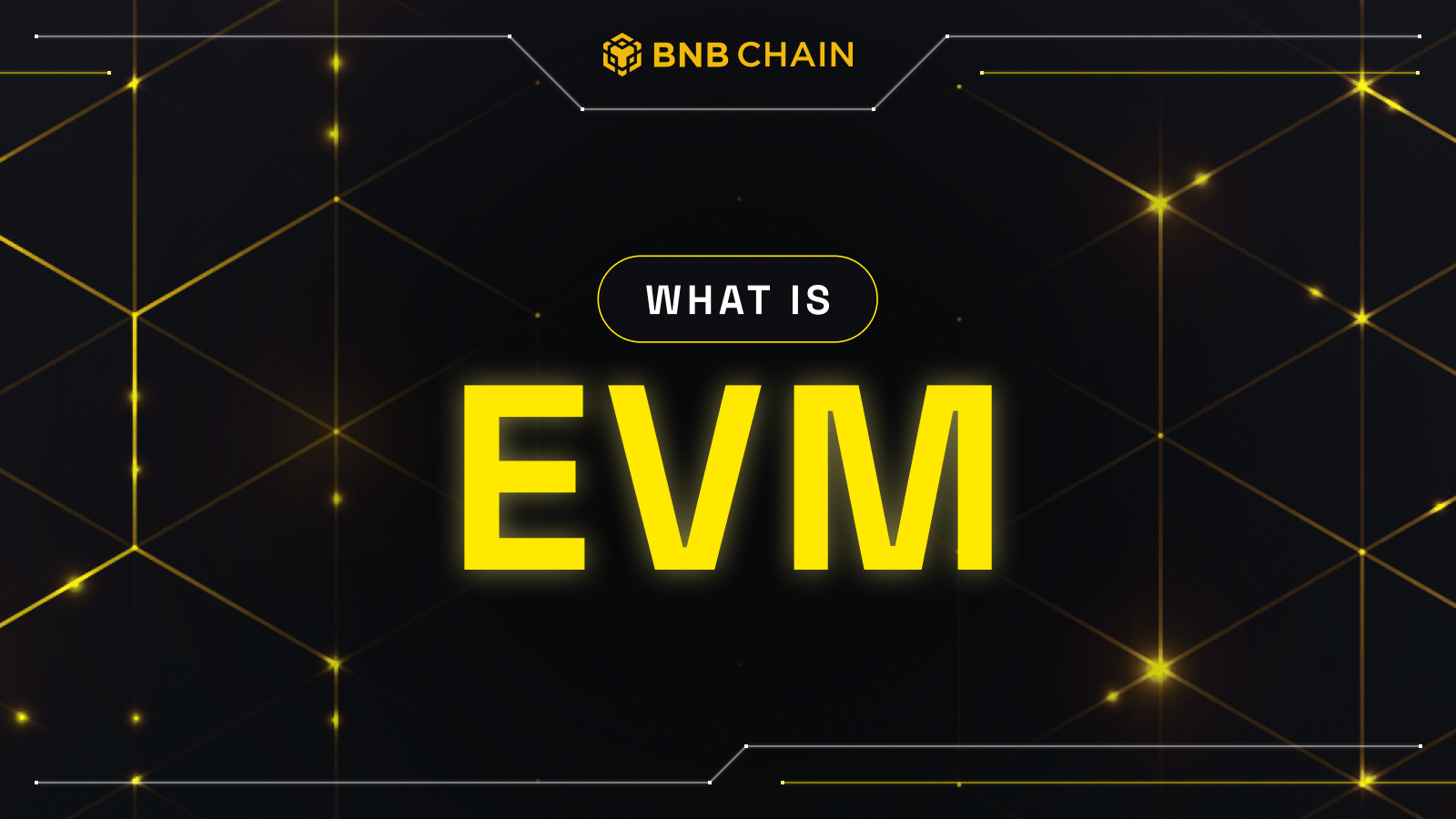Chuỗi
BNB Beacon Chain
Lớp quản trị & stake của hệ sinh thái BNB Chain
Nhà phát triển
Hệ sinh thái
Cộng đồng
What Is EVM? Everything You Need to Know about Ethereum Virtual Machine

The Ethereum Virtual Machine (EVM) is a Turing-complete execution engine for smart contracts and Dapps on networks like BNB Chain and Ethereum. What is EVM, you might ask? It's essentially the powerhouse that operates on a stack-based architecture, using a gas system to manage resources and ensure network sustainability. EVM-compatible chains enhance interoperability and development across platforms, making it a central element in the blockchain ecosystem.
EVM, is at the core of the smart contract ecosystem. It is a crucial component that serves as an execution engine that powers decentralized applications (Dapps) and smart contracts. In this blog post, we will answer the "what is EVM" question, unravel its complexities and understand its role, functionality, and overall impact.
What is EVM?
At its essence, the EVM is a Turing-complete virtual computing engine embedded within smart contract networks. It acts as a global, decentralized processor, executing smart contracts and Dapps across the underlying distributed ledger.
When it comes to design, EVM is a virtual instruction interpreter similar to the Java Virtual Machine (JVM). It executes bytecode, which is a series of specialized instructions packaged within transactions. These transactions, submitted by users, ultimately modify the state of the network.
Here’s How the EVM Works
EVM operates on a stack-based architecture with a 256-bit word size optimized for cryptographic operations like hashing and elliptic curve calculations, which are integral to securing transactions. It interprets smart contracts written in languages such as Solidity and Vyper, converting them into bytecode.
When a transaction is initiated to execute a smart contract, the EVM loads with the transaction data, including a specified amount of gas that decreases as operations are performed. If the gas depletes before the transaction completes, the transaction is halted and considered invalid, although fees are still paid to the miner for computational efforts up to that point.
Smart contracts on EVM can call other contracts. Each new call loads another EVM instance with the necessary data inherited from the original transaction. Insufficient gas during these operations results in a rollback to the state before the transaction attempt.
Breaking down the steps:
- Transactions compete to be included in a block. Once selected, they proceed to the EVM.
- The EVM reads and executes these opcodes one by one.
- As the EVM processes transactions, it needs to access and update the global state database, which holds information about all accounts and their balances.
Core Properties of the EVM
Let’s go through some of the core properties and features of the EVM.
#1 Decentralization
The EVM's decentralized nature ensures that smart contract platforms like Ethereum and BNB Chain remain robust and resistant to control by any single authority. This is accomplished through collective verification and execution of code by nodes distributed across the network. This setup fosters a trustless environment where transactions are transparent and immutable.
#2 Turing complete
A unique aspect of the EVM is its Turing completeness. This means the EVM can theoretically execute any computation, given enough resources, which opens up endless possibilities for application development.
To manage these computational resources efficiently and prevent network abuse, the EVM employs a gas system. This system quantifies the computational effort required for transactions and smart contract executions, ensuring the network's sustainability.
What Is EVM Compatibility?
Being the original smart contract platform, Ethereum has already fostered a rich and diverse developer community. EVM compatibility allows developers to deploy Ethereum-based smart contracts and Dapps on their chain without significant modifications.
The primary advantage of EVM compatibility is fostering interoperability among blockchain networks. It ensures seamless communication and interaction with the Ethereum mainnet, supporting cross-chain transactions, asset transfers, and data sharing. This interconnected network expands the operational capabilities and reach of decentralized platforms.
Moreover, EVM-compatible chains provide a familiar environment for developers accustomed to Ethereum's tools and languages, making it easier for them to develop and innovate. This familiarity reduces the learning curve and barriers to entry, encouraging broader adoption and development across these platforms.
What is Different About BSC EVM?
BNB Smart Chain (BSC), in collaboration with NodeReal, is pioneering the integration of parallel EVM solutions within its ecosystem.
Parallel EVM is broken down into the following three phases:
- Parallel EVM v1.0 - Infrastructure
- Parallel EVM v2.0 - Performance
- Parallel EVM v3.0 - Production
The approach involves:
- Transaction scheduling: Efficiently distributing transactions across multiple EVM instances to optimize resource usage.
- Dependency detection: Implementing mechanisms to detect inter-transaction dependencies prior to execution to ensure correct processing order.
- State merging: After parallel processing, results from individual EVM instances are merged into a consistent state update, ensuring that the stateDB accurately reflects the outcome of all transactions.
The potential of parallel BSC EVM
- Enhanced scalability: Parallel BSC EVM aims to overcome these scalability limits by allowing independent transactions to be processed simultaneously. This is achieved by running multiple EVM instances across different threads, each handling a subset of transactions independently.
- Optimizing parallelism: BSC is exploring strategies to maximize the parallel processing capabilities of the EVM, including advanced scheduling algorithms and dependency management techniques that could further boost transaction throughput and system efficiency.
What Is EVM? Conclusion
EVM is a fundamental component of the blockchain ecosystem, providing a decentralized, Turing-complete environment for executing smart contracts and supporting Dapps. Its robust architecture allows for secure and efficient transaction processing and offers a thriving ecosystem of developers and applications
Innovations like BSC's parallel EVM solutions further push the boundaries, aiming to significantly enhance scalability and optimize resource usage across the network.
Follow us to stay updated on everything BNB Chain
Website | Twitter | Telegram | Facebook | dApp Store | YouTube | Discord | LinkedIn | Build N' Build Forum